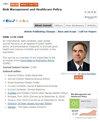The Effects of the Multi-Hospital Global Budget Payment on Medical Expenditure and Service Volume: The Evidence from Dangyang County, China
IF 2.7
4区 医学
Q2 HEALTH CARE SCIENCES & SERVICES
引用次数: 0
Abstract
Background: Global budget payment is currently the prevailing payment strategy internationally. In China, the concept of multi-hospital global budget payment has been proposed with the aims of achieving cost control effects while also encouraging hospital collaboration and optimising allocation of healthcare resources. This study seeks to analyse the impact of multi-hospital global budget payment in China on healthcare expenditure and service volume.Materials and Methods: A retrospective comparative study was carried out in Dangyang County, China. The exposure cases were migrants who were not locally registered in the residence registration system. The study period encompassed January 1, 2017, to December 31, 2019. Including 3,246,164 outpatient medical records and 242,685 inpatient medical records. The key variables are medical expenditure and service volume indicators. Continuous variables were reported as mean and tested by t-test. We used interrupted time series analysis models to estimate the changes in the level and trend of each outcome measure after the policy.
Results: After the outpatient global budget payment reform, the monthly medical expenditure of the hospital alliance has transitioned from a discernible upward trajectory to a deceleration in the rate of growth. The outpatient volume in public and private high-level hospitals decreased at a rate of − 419.26 person/month and − 137.04 person/month, respectively. In terms of inpatient service volume, only private high-level hospitals reported a decrease, with a reduction rate of − 15.38 individuals per month.
Conclusion: This study presents new evidence demonstrating that the multi-hospital global budget payment can effectively control costs and promote resource reallocation when implemented jointly with hospital alliance policies. However, overly lenient budget caps risk counterproductive effects.
多医院全球预算支付对医疗支出和服务量的影响:来自中国丹阳的证据
背景:全球预算支付是目前国际上通行的支付策略。在中国,多医院全球预算支付的概念已经提出,其目的是在实现成本控制效果的同时,鼓励医院合作,优化医疗资源配置。本研究旨在分析中国多医院全球预算支付对医疗支出和服务量的影响:在中国丹阳县开展了一项回顾性比较研究。研究对象为未在当地进行户籍登记的流动人口。研究时间为 2017 年 1 月 1 日至 2019 年 12 月 31 日。包括 3,246,164 份门诊病历和 242,685 份住院病历。关键变量为医疗支出和服务量指标。连续变量以均值报告,并通过 t 检验。我们使用间断时间序列分析模型来估算政策实施后各结果指标的水平和趋势变化:结果:门诊全球预算支付改革后,医院联盟的月医疗支出从明显的上升轨迹过渡到增长速度的下降。公立和民营高水平医院的门诊量分别以-419.26 人/月和-137.04 人/月的速度下降。在住院服务量方面,只有私立高级医院报告了下降,下降率为-15.38 人/月:本研究提供的新证据表明,多医院全球预算支付与医院联盟政策共同实施时,可有效控制成本并促进资源重新分配。然而,过于宽松的预算上限有可能产生适得其反的效果。
本文章由计算机程序翻译,如有差异,请以英文原文为准。
求助全文
约1分钟内获得全文
求助全文
来源期刊

Risk Management and Healthcare Policy
Medicine-Public Health, Environmental and Occupational Health
CiteScore
6.20
自引率
2.90%
发文量
242
审稿时长
16 weeks
期刊介绍:
Risk Management and Healthcare Policy is an international, peer-reviewed, open access journal focusing on all aspects of public health, policy and preventative measures to promote good health and improve morbidity and mortality in the population. Specific topics covered in the journal include:
Public and community health
Policy and law
Preventative and predictive healthcare
Risk and hazard management
Epidemiology, detection and screening
Lifestyle and diet modification
Vaccination and disease transmission/modification programs
Health and safety and occupational health
Healthcare services provision
Health literacy and education
Advertising and promotion of health issues
Health economic evaluations and resource management
Risk Management and Healthcare Policy focuses on human interventional and observational research. The journal welcomes submitted papers covering original research, clinical and epidemiological studies, reviews and evaluations, guidelines, expert opinion and commentary, and extended reports. Case reports will only be considered if they make a valuable and original contribution to the literature. The journal does not accept study protocols, animal-based or cell line-based studies.
 求助内容:
求助内容: 应助结果提醒方式:
应助结果提醒方式:


